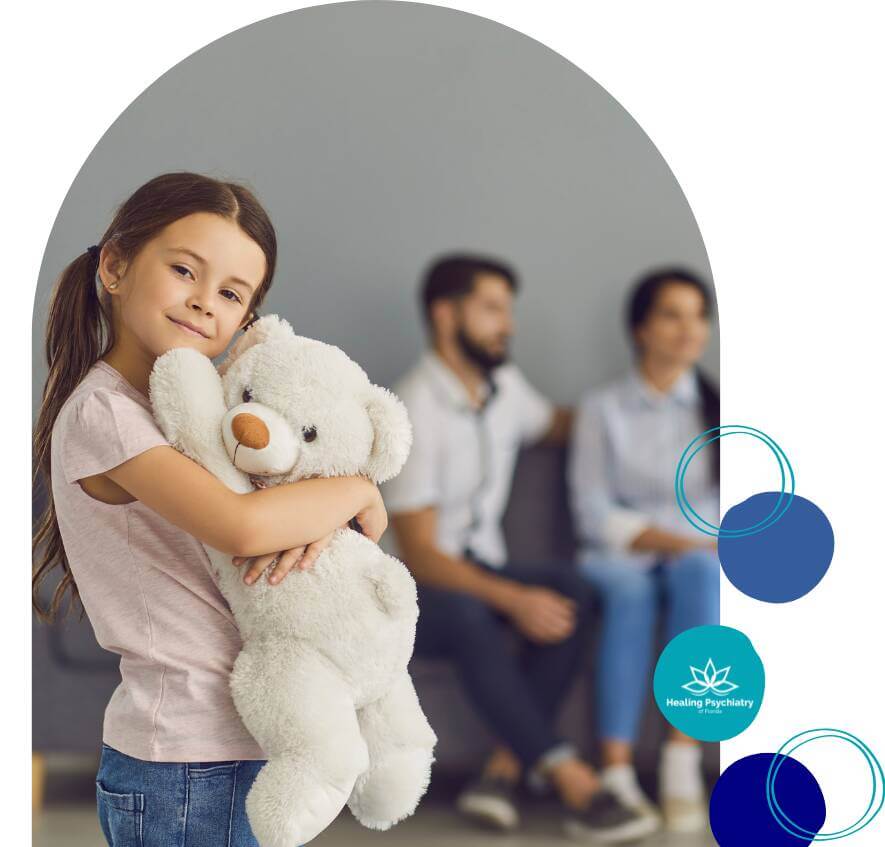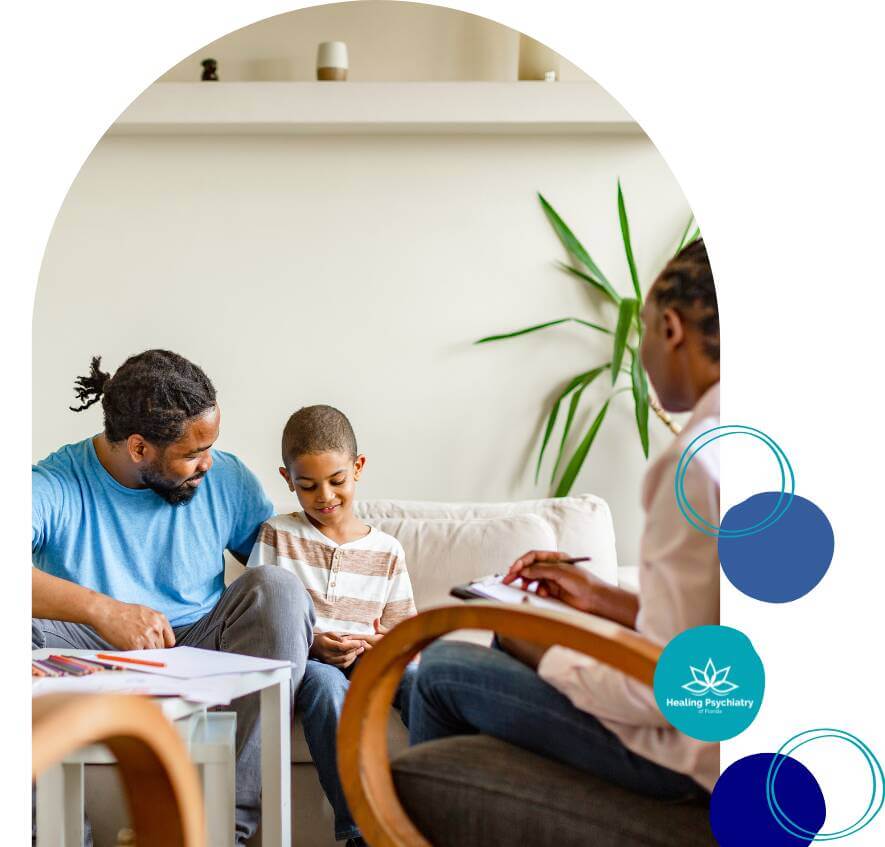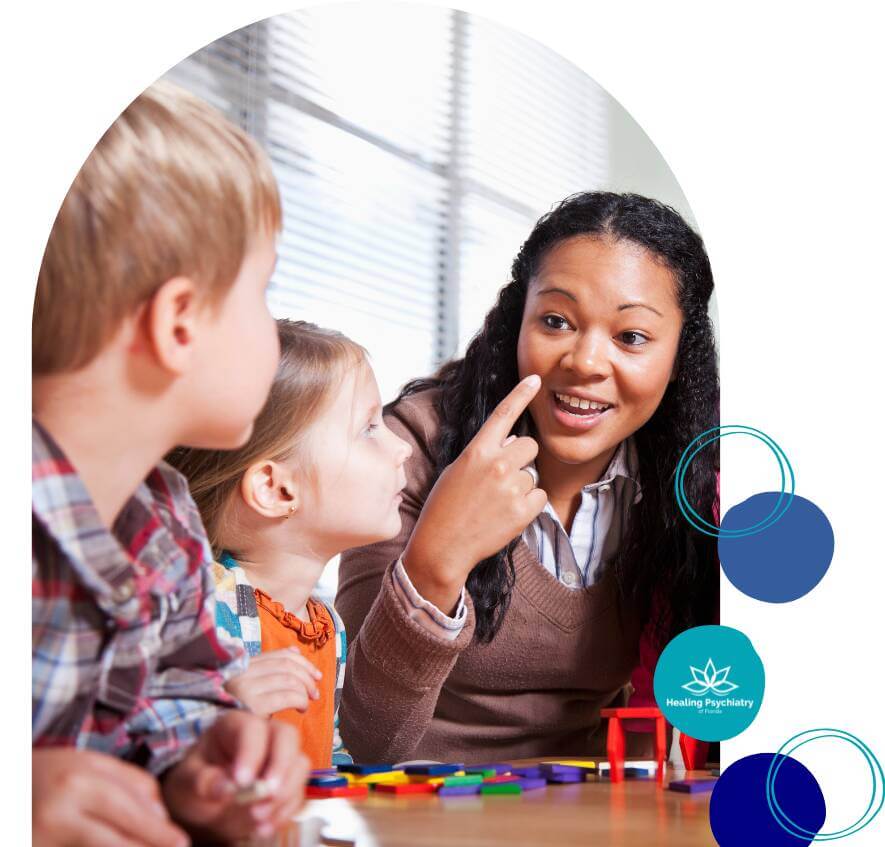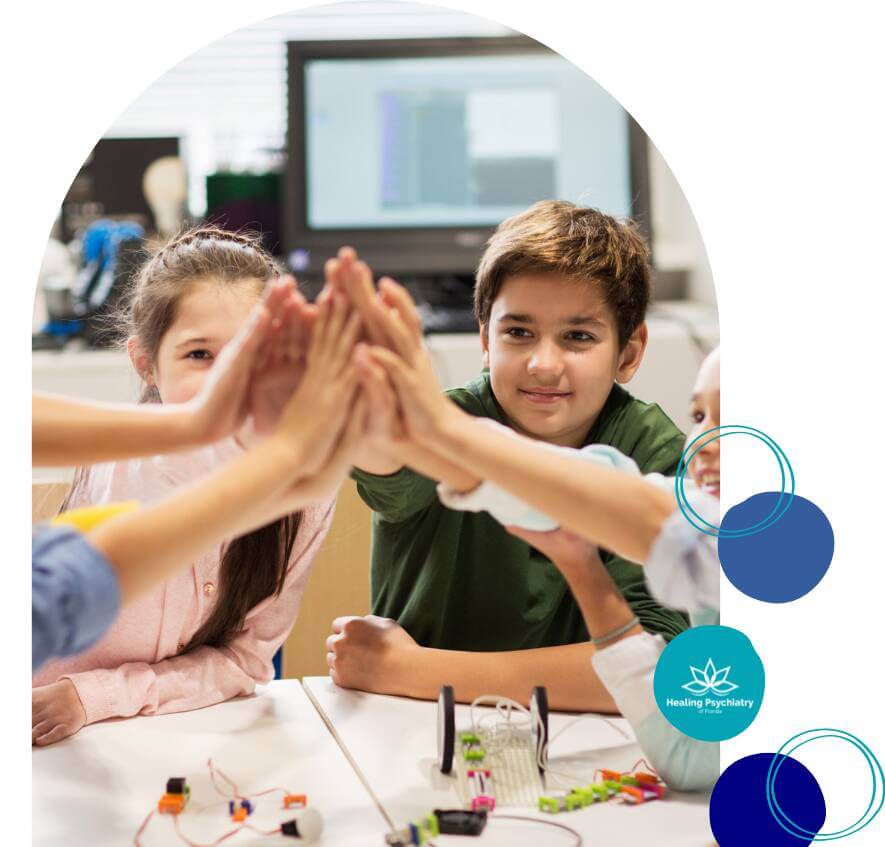Children’s Therapy for Emotional Regulation
Children today face high expectations to stay calm, flexible, and emotionally aware in every environment—school, home, and social settings. Yet, many haven’t fully developed the skills to manage big feelings or express their needs clearly, often leaving them overwhelmed or misunderstood.
At Healing Psychiatry of Florida, we offer children’s therapy focused on emotional regulation. Using supportive coaching, role play, and skill-building, we help kids identify emotions, communicate effectively, and self-regulate with confidence. These tools not only support calm behavior but also lay the foundation for strong decision-making and healthy relationships.

Start Your Session Today
What Emotional Dysregulation Looks Like in Children
Emotional dysregulation in children shows up as more than just occasional frustration. It disrupts daily life, overwhelms communication, and affects a child’s ability to connect, adapt, and participate fully in their environment. Children who haven’t developed strong emotional regulation skills often experience intense emotional reactions that seem to come from nowhere and don’t resolve easily.
When Emotions Take Over Behavior
Children who struggle with emotional regulation often react with big emotions that completely redirect their behavior. A small disappointment might lead to yelling, throwing, or a total shutdown. Anger builds quickly, tears surface unexpectedly, and emotional self-regulation feels out of reach. These reactions can happen at school, with friends, or at home during routine moments.
The Impact on Relationships, Learning, and Self-Confidence
Difficulties with emotional regulation affect how children interact with teachers, peers, and family members. Misreading social cues, struggling to name emotions, and reacting instead of responding make friendships harder to build and maintain. Older children may begin to avoid group activities or withdraw from peer relationships to avoid embarrassment or conflict.
Why These Challenges Don’t Just Pass with Age
A lack of emotional regulation doesn’t resolve on its own. Without intervention, children grow into adolescents who still rely on the same emotional habits they developed early on. Big feelings continue to dictate behavior, and coping strategies remain underdeveloped. Emotional regulation abilities become increasingly essential as social expectations grow more complex and consequences more significant.
Insurances Accepted










See what others are saying about Healing Psychiatry of Florida
Meet Our Specialists
The clinicians at Healing Psychiatry of Florida are experienced in helping children build emotional regulation abilities that shape how they react, recover, and relate. Every mental health professional on our team understands the complexity of emotional development and works with intention to guide each child toward more regulated behavior.




How We Help Children Strengthen Emotional Regulation
Children build emotional regulation skills through guided practice, clear feedback, and consistent emotional coaching. Our therapists use strategies like role play, naming emotions, and modeling language that support emotional understanding. These approaches help kids recognize their emotional state before it escalates and learn how to pause, reflect, and choose a response that matches the situation.
Teaching Skills That Transfer Into Everyday Life
Therapy sessions are structured to teach self-regulation skills that children can apply beyond the clinic. Kids learn how to identify triggers, use language to express feelings, and apply positive opposites to reframe negative emotions. Practicing these tools regularly builds the emotional awareness needed to respond effectively to everyday challenges with peers, siblings, teachers, and other adults.
We teach children problem-solving skills, including setting limits, using self-talk, and choosing responses that align with their goals and values. Self-regulation becomes more than a therapy goal—it becomes a practical toolkit that helps children succeed in moments that once overwhelmed them.


What Real Progress Looks Like
Children who gain emotional regulation abilities begin to respond differently in situations that once triggered intense emotional reactions. They show more awareness of their emotional state, increased ability to control impulses, and a noticeable shift in how they interact with peers and adults. Big feelings still arise, but the child has the tools to process and manage them confidently
Progress also appears in how children speak about their own emotions. They use clearer language, take ownership of their choices, and deal with difficult moments without escalating.
Children’s Therapy for Emotional Regulation FAQs
How does emotional regulation therapy help improve social skills?
Therapy supports the development of social skills by helping children regulate their emotions during peer interactions, understand social cues, and express themselves in ways that build connection. As emotional awareness grows, children experience stronger relationships, clearer boundaries, and more confidence with friends and classmates.
Why do some kids struggle more than others with emotional regulation?
Emotional development happens at a different pace for every child. Factors such as temperament, language development, sensory sensitivity, or life stressors can influence a child’s behavior and ability to manage emotional states. Kids struggle when they don’t yet have the tools to process big emotions or respond to frustration healthily. Therapy introduces those tools in a structured and supportive way.
What role do communication skills play in emotional regulation?
How do you help children who shut down or act out when frustrated?
Therapists use structured tools like the red light / green light model to help children identify when they’re approaching emotional overload. Green light moments represent calm readiness; red light signals the need for pause and reflection. Teaching children to notice these cues and apply new skills—like breathing, asking for space, or labeling a feeling—helps them solve problems instead of shutting down or lashing out.
How do you balance supporting children while still setting limits?
Therapy creates a nonjudgmental space where children learn that emotions are valid, but not all behaviors are acceptable. Setting boundaries is a critical role of emotional development. Children benefit when they are supported through emotional experiences while still being guided toward accountability, structure, and problem-solving strategies.
How long does it take before children develop emotional regulation skills they can use every day?
Children develop emotional regulation through repetition, reinforcement, and reflection. For many families, early signs of growth appear within the first several months of consistent therapy. Over time, children begin applying their emotional skills in real-world moments—during transitions, disagreements, or moments of disappointment. These responses build slowly, but the long-term impact on confidence, relationships, and resilience is lifelong.
Contact us
For more information about our systems and services, contact Healing Psychiatry of Florida.
Healing Psychiatry of Florida
108 W Citrus St, Altamonte Springs, FL 32714
help@healingpsychiatryflorida.com
Opening Hours
Monday – Thursday: 8AM – 7PM
Friday: 8AM – 5PM
Saturday: Closed
Sunday: Closed
OCD Therapy Altamonte Springs, FL
